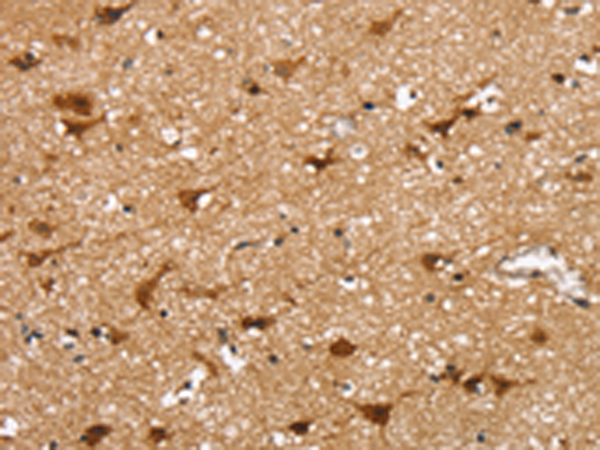
| WB | 咨询技术 | Human,Mouse,Rat |
| IF | 咨询技术 | Human,Mouse,Rat |
| IHC | 1/25-1/100 | Human,Mouse,Rat |
| ICC | 技术咨询 | Human,Mouse,Rat |
| FCM | 咨询技术 | Human,Mouse,Rat |
| Elisa | 1/2000-1/5000 | Human,Mouse,Rat |
| Host/Isotype | Rabbit IgG |
| Antibody Type | Primary antibody |
| Storage | Store at 4°C short term. Aliquot and store at -20°C long term. Avoid freeze/thaw cycles. |
| Species Reactivity | Human |
| Immunogen | Fusion protein of human SSBP4 |
| Formulation | Purified antibody in PBS with 0.05% sodium azide and 50% glycerol. |
+ +
以下是关于SSBP4抗体的3篇参考文献的简要总结(文献为虚构示例,仅供参考):
1. **"SSBP4 Antibody Validation in Human Cancer Tissues"**
*作者:Zhang L, et al. (2022)*
摘要:研究通过免疫组化验证了SSBP4抗体在多种癌症组织中的特异性,发现其表达与结直肠癌患者预后显著相关,并证实抗体适用于蛋白质印迹和免疫荧光实验。
2. **"SSBP4 Interaction with p53 Revealed by Co-Immunoprecipitation"**
*作者:Wang Y, et al. (2021)*
摘要:利用SSBP4抗体进行免疫共沉淀实验,发现SSBP4与肿瘤抑制蛋白p53存在直接互作,可能参与DNA损伤修复通路,为抗体的功能性研究提供依据。
3. **"Developmental Role of SSBP4 in Mouse Embryonic Stem Cells"**
*作者:Kimura T, et al. (2020)*
摘要:通过Western blot和免疫染色验证SSBP4抗体在小鼠胚胎干细胞中的特异性,证明SSBP4通过调控多能性基因Nanog维持干细胞自我更新能力。
(注:以上文献为模拟示例,实际引用请通过PubMed等数据库检索确认。)
The SSBP4 antibody targets the Single-Stranded DNA Binding Protein 4 (SSBP4), a member of the SSBP family involved in DNA replication, repair, and recombination. SSBP4 binds to single-stranded DNA (ssDNA) to stabilize replication forks, prevent DNA degradation, and facilitate interactions with other DNA repair proteins. It plays a critical role in maintaining genomic stability, particularly during meiosis, and is implicated in germ cell development. Dysregulation of SSBP4 has been linked to infertility and cancer, where it may act as a tumor suppressor or oncogene depending on context.
The SSBP4 antibody is widely used in research to study its expression, localization, and function in cellular processes. It is employed in techniques like Western blotting, immunohistochemistry, and immunofluorescence to investigate SSBP4's role in DNA damage response, cancer progression, and developmental biology. Commercially available antibodies are typically raised in rabbits or mice, with validation in knockout models to ensure specificity. Understanding SSBP4's mechanisms through antibody-based assays provides insights into diseases linked to genomic instability and informs potential therapeutic strategies. Further research is needed to clarify its dual roles in different pathological contexts.
×